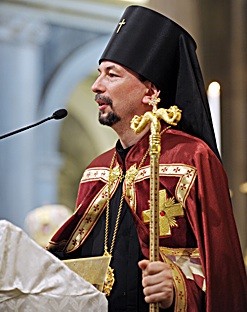The Church mourns Father Clarence Gallagher, SJ, who died yesterday in England.
Tag: Pontifical Oriental Institute
Milan Lach nominated auxiliary bishop of Presov
There is a new auxiliary bishop for Greek Catholic Archeparchy of Presov, Slovakia, Jesuit Father Milan Lach. He is the first Jesuit to be elected a bishop during the pontificate of Pope Francis.
Bishop-elect Lach will join another Jesuit who serves as the Archbishop of Presov, Ján Babjak, 59. The archeparchy has more than 140 thousand people. Archbishop Babjak was just here in the USA making a pastoral visit.
Bishop-elect Milan, 39, has been the vice-dean of the the Faculty of Theology of the University of Trnava. Lach entered the Society of Jesus (the Jesuits) in 1995 and ordained priest in 2001. For 2 years he worked at the Centre of Spirituality East-West of Michal Lacko, where he was also the Jesuit superior. In the 2009 he was awarded a degree in spirituality at the Pontifical Oriental Institute and livingnext door at the Pontifical Russian College.
In 2010 he became a member of the editorial board of the theology journal, Verba Theologica.
Mnohaja l’ita!
Jesuit presence therefore influence in Rome
A significant Jesuit presence in key places for the Church’s ministry of proclaiming and living the Gospel exists that few may not be aware of. Since the time of Saint Ignatius of Loyola, the Society has done some remarkable things for the good of the Church. And every Pope since Paul III has relied on generosity of thinking and action of the Jesuits in Rome. Pope Francis has asked the Society to continue… Presence means influence.
Interesting stats:
- 12 Pontifical residences in Rome are staffed by Jesuits;
- 3 Pontifical institutions for higher learning in Rome: The Gregorian University, the Oriental and Biblical Institutes;
- 1 Radio center (Vatican Radio);
- 1 journal (La Civiltà Cattolica);
- 6 Jesuit cardinals: but only one of them participated in the 2013 conclave, Jorge Mario Cardinal Bergoglio, archbishop of Buenos Aires (Argentina). The other Cardinal entitled to participate, Julius Riyadi Cardinal Darmaatmadja, Archbishop-emeritus of Jakarta (Indonesia), was unable to attend due to ill health;
- The Pontifical Gregorian University indicates that there are 57 Cardinal alumni of Jesuit pontifical institutions in Rome, the Gregorian and the Biblicum (49.6% of all participants in the Conclave). Several of them were also professors at the Gregorian University: Raymond Leo Cardinal Burke, William Joseph Cardinal Levada, Velasio Cardinal DePaolis, CS, Timothy Michael Cardinal Dolan, Francesco Cardinal Coccopalmerio, and Walter Cardinal Kasper (not an exhaustive list.);
- And other works coordinated by the Jesuit Curia under the leadership of the Jesuit Superior General.
Catholic University Looks East
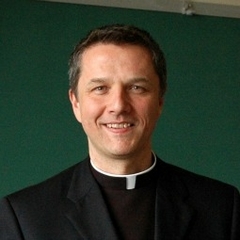 Salvation comes from the East! You’ve heard that before, no? If not, then it is news you ought to welcome, not just because an Eastern Catholic priest, Father Mark Morozowich is the new Dean of the School of Theology at the Catholic University of America.
Salvation comes from the East! You’ve heard that before, no? If not, then it is news you ought to welcome, not just because an Eastern Catholic priest, Father Mark Morozowich is the new Dean of the School of Theology at the Catholic University of America.
Father Samir Khalil Samir speaks on Egyptian reform today
Egyptian Jesuit Father Samir Khalil Samir is a Professor
at Rome’s Pontifical Oriental Institute and scholar on Islam spoke to Emer
McCarthy, an interviewer at Vatican Radio who asked by if a Western concept of political
democracy is adequate to Egypt and other Arab nations. Father Samir saidit is
“applicable but not yet practicable.”
all is justice, equality, social reform because the gap between rich and poor
is far too wide and this is the real cause of the Islamic fundamentalist
movement. We need change, the Arab world must change. We need alternate parties
but in our countries there is nothing”.
authoritarian regimes they systematically destroy all the leaderships so only
people who are in agreement with the current system are in power”. In the case
of Egypt “Mubarack nominated his second in command, Omar Suleiman who is a good
diplomat a military officer. But the question is this good for the country?”.
Meeting the new rector at the Pontifical Oriental Institute
In May, the announcement of a new rector was made that the Pontifical Oriental Institute in Rome, a Jesuit work for the universal Church, Jesuit Father James McCann. The new rector is a member of the Chicago Province of Jesuits, is 61 years old and was ordained a priest in 1979.
Pontifical Oriental Institute gets new rector: James M. McCann
Jesuit Father James McCann has been named Rector of the
Pontifical Oriental Institute by Pope Benedict XVI. Father McCann will assume
his duties in Rome in September of 2010. His academic and ecclesial
administration coupled with his expertise in Eastern churches and society (the
focus of the Pontifical Oriental Institute) makes this appointment easy to
understand why he’s a good choice. He’ll be fresh air to the Oriental Institute
like his immediate predecessor did prior to be named an archbishop-secretary
for the Vatican office for Eastern churches last year.
The Pontifical Oriental Institute was founded by Pope Benedict XV in 1917 as a center for higher studies in Eastern Christianity.
Read Father McCann’s bio here: New PIO Rector.pdf
Cyril Vasil ordained bishop
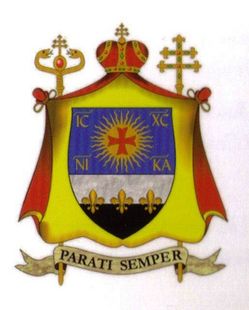 As I noted a few weeks ago, Jesuit Father Cyril Vasil, 44, was nominated by the Pope to be Secretary for the Congregation for the Eastern Churches serving the Church with Cardinal Leonardo Sandri. He was ordained a bishop today in the papal Basilica of Saint Mary Major, across the street from where he resided and taught Eastern Canon Law at the Pontifical Oriental Institute. Today, is also the Archbishop’s 22nd anniversary ordination as a priest and both ordinations were done by the same bishop.
As I noted a few weeks ago, Jesuit Father Cyril Vasil, 44, was nominated by the Pope to be Secretary for the Congregation for the Eastern Churches serving the Church with Cardinal Leonardo Sandri. He was ordained a bishop today in the papal Basilica of Saint Mary Major, across the street from where he resided and taught Eastern Canon Law at the Pontifical Oriental Institute. Today, is also the Archbishop’s 22nd anniversary ordination as a priest and both ordinations were done by the same bishop.
Cyril Vasil: the new secretary for the Congregation of Eastern Churches
Great News! Today, the Holy Father nominated Reverend Father
Cyril Vasil, SJ, until now the rector of the Pontifical Oriental Institute, as
the Secretary to the Congregation for Eastern Churches, raising him to the
dignity of archbishop.
Archbishop-elect Cyril Vasil was born in 1965 (in Slovakia),
ordained a priest in 1987, entered the Society of Jesus in 1990 taking solemn
vows in 2001. In 1994 he earned a doctorate in Canon Law from the Pontifical
Oriental Institute. He has a working knowledge of 11 languages.
In 2002, Cyril Vasil was elected dean of the faculty of
Oriental Canon Law and in 2007 he was named rector of the Pontifical Oriental
Institute. He is the first rector of the PIO to be of the Byzantine Catholic Church.
Among his responsibilities for the Church he is a consultor
for the Congregations of Eastern Churches, Doctrine of the Faith and Pastoral
Care of Migrants. Moreover, he was an expert for the 2005 Synod of Bishops on
the Eucharist. And he’s been active in the International Union of Scouts of
Europe being named a spiritual advisor in 2003.
I can say that this is an excellent choice for the Church: he’s
affable and competent. With Archbishop Vasil’s appointment there are now two Jesuits in prominent positions in the Roman Curia, both are archbishop secretaries. It is also interesting to note that the new archbishop is the first in history working as a Vatican official to be the son of a married Catholic priest of Slovak Greek-Catholic Church, the vast majority of whose clergy are married family men in accord with the age-old (and fully salutary) tradition in the Byzantine East, Catholic and Orthodox. His father, Michael, was ordained by Blessed Vasil Hopko.
Fr. Robert F. Taft gives keynote address honoring the late Fr. Alexander Schmemann
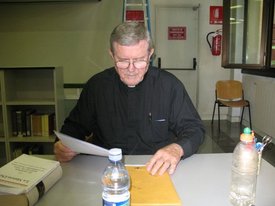 Many are familiar with the name of the great liturgical scholar the Right Reverend Archimandrite Robert Francis Taft because they actually know him (and thus love him), or know his very extensive list of publications (more than 850) on matters pertaining to liturgical history or because of an experience him in the classroom or merely because they heard of him. Whatever the case may be this blog entry is not panegyric of Father Robert Taft but a way of encouraging you to listen to his keynote address on the point of liturgy AND the enduring influence of the late Father Alexander Schmemann at the symposium noted below: it will shape anew your thinking on the Church’s liturgical life.
Many are familiar with the name of the great liturgical scholar the Right Reverend Archimandrite Robert Francis Taft because they actually know him (and thus love him), or know his very extensive list of publications (more than 850) on matters pertaining to liturgical history or because of an experience him in the classroom or merely because they heard of him. Whatever the case may be this blog entry is not panegyric of Father Robert Taft but a way of encouraging you to listen to his keynote address on the point of liturgy AND the enduring influence of the late Father Alexander Schmemann at the symposium noted below: it will shape anew your thinking on the Church’s liturgical life.
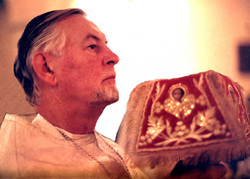 Saint Vladimir’s Orthodox Theological Seminary held an international liturgical symposium honoring one of the best of liturgical scholars to walk the earth 29-31 January 2009: “The Past and Future of Liturgical Theology: Celebrating the Legacy of Father Alexander Schmemann.”
Saint Vladimir’s Orthodox Theological Seminary held an international liturgical symposium honoring one of the best of liturgical scholars to walk the earth 29-31 January 2009: “The Past and Future of Liturgical Theology: Celebrating the Legacy of Father Alexander Schmemann.”
The talks are thus far available in podcasts noted here.
The other speakers at the conference:
His Grace the Rt. Rev. Maxim [Vasiljevic], Bishop of the Western Diocese of the Serbian Orthodox Church in North and South America; “Opening Episcopal Remarks”
Dr. Michael Aune, Dean of the Faculty, Dean of the Chapel, Professor of Liturgical and Historical Studies at Pacific Lutheran Seminary, and Core Doctoral Faculty in Liturgical Studies at General Theological Union; “The Current State of Liturgical Theology: A Plurality of Particularities”
The Rt. Rev. Archimandrite Job [Getcha], former Dean of St. Sergius Theological Institute, Paris; “From Master to Disciple: The Notion of ‘Liturgical Theology’ in Father Kiprian Kern and Father Alexander Schmemann”
Keynote by The Rt. Rev. Archimandrite Robert Taft, SJ; “The Liturgical Enterprise Twenty-five Years after Alexander Schmemann [1921-1983]: The Man and His Heritage”
Dr. Bryan D. Spinks, Professor of Liturgical Studies, Yale Divinity School; “From Liturgical Theology to Liturgical Theologies: Schmemann’s Legacy in Western Churches”
The Rev. Dr. Stephanos Alexopoulos, Professor at the International Center for Hellenic and Mediterranean Studies, Athens, Greece; “Did the Work of Father Alexander Schmemann Influence Modern Greek Theological Thought? A Preliminary Assessment”
Sr. Dr. Vassa Larin, nun of the Russian Orthodox Church Abroad; currently teaching Liturgical Studies at the University of Vienna; “Father Alexander Schmemann and Monasticism”
Dr. David W. Fagerberg, Associate Professor in the Department of Theology, University of Notre Dame; “The Cost of Understanding Schmemann, in the West”
The Most Blessed Jonah [Paffhausen], Archbishop of Washington and New York and Metropolitan of All America and Canada, Orthodox Church in America; “Closing Episcopal Remarks.”




